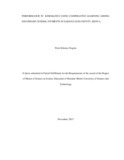Please use this identifier to cite or link to this item:
http://ir-library.mmust.ac.ke:8080/xmlui/handle/123456789/269| Title: | PERFORMANCE IN KINEMATICS USING COOPERATIVE LEARNING AMONG SECONDARY SCHOOL STUDENTS IN SABATIA SUB-COUNTY, KENYA. |
| Authors: | Sogoni, Peter Kelonye EDS/G/05/11 |
| Keywords: | Final Experiment in Kinematics Integrated Science Process Skills Kenya Institute of Curriculum Development Final Experiment in Kinematics Strengthening of Mathematics and Science in Secondary Education Science Process Skills Observation Checklist |
| Issue Date: | Nov-2017 |
| Publisher: | MMUST |
| Abstract: | Performance in physics at secondary school level in Sabatia sub-county has shown no significant improvement in recent years. Analysis by the Kenya National Examinations Council indicates that students do poorly in kinematics and this affects their overall performance in physics. This poor performance has mainly been attributed to conventional methods of teaching physics. It has been observed that schools that perform well emphasize the use of emerging instructional methods such as cooperative learning. There was therefore a need to investigate performance in kinematics using cooperative learning among secondary school students. Therefore, the purpose of the study was to determine the effect of using cooperative learning on performance among the secondary school students in Sabatia Sub-County, Kenya. The research objectives were to determine the effect of cooperative learning on academic achievement in kinematics, measure the effect of cooperative learning on development science process skills in kinematics , and determine the effect of cooperative learning on attitude in kinematics .A quasi-experimental pre-test, post-test non-equivalent research design was adopted for the study. The study population involved 270 form three students doing physics in public mixed secondary schools in Sabatia sub-county. Purposive sampling was used to select two schools that were used in the pilot study. Simple random sampling was used to select 10 schools from where the respondents were drawn. After which simple random sampling was used to select one class from each school and all the students in the selected class were assigned to either experimental or control group. Experimental or Control groups were drawn from different schools. Reliability of the instruments was determined through a test-retest technique for the achievement tests, through observation of development of skills and demonstration of scientific attitudes in experiments in kinematics for the checklists. The Achievement Test in Kinematics 1 yielded a reliability of 0.84, Achievement Test in Kinematics 2 yielded 0.85, Science Process Skills Observation Checklist yielded 0.785 and Science Attitudes Observation Checklist yielded 0.767. Therefore each of the piloted instruments had a reliability coefficient of above 0.7 which was deemed satisfactory. Data were collected using students’ achievement test in kinematics, students’ science process skills observation checklist and students’ attitudes observation checklist. Data was analyzed manually using inferential and descriptive statistics. It was concluded that cooperative learning was effective in enhancing performance in kinematics among the students. Finally, the study recommended the use cooperative learning in order to improve performance in kinematics among secondary school students. |
| URI: | http://r-library.mmust.ac.ke/123456789/269 |
| Appears in Collections: | School of Education |
Files in This Item:
| File | Description | Size | Format | |
|---|---|---|---|---|
| PERFORMANCE IN KINEMATICS USING COOPERATIVE LEARNING AMONG SECONDARY SCHOOL STUDENTS IN SABATIA SUB-COUNTY, KENYA..pdf | 1.68 MB | Adobe PDF |  View/Open |
Items in DSpace are protected by copyright, with all rights reserved, unless otherwise indicated.
